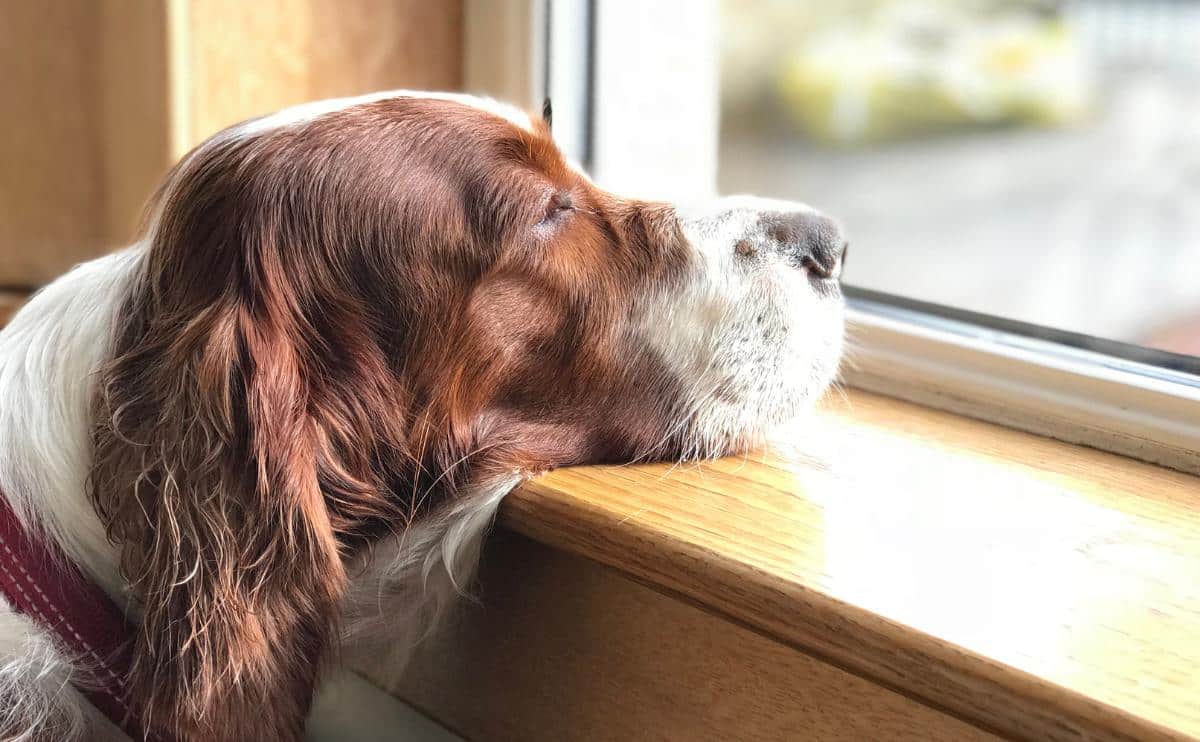While you buy via hyperlinks on our web site, we could earn a fee. Right here’s the way it works.
The day I stated goodbye to my previous canine, Finn, I believed I had an emotional deal with on the toughest half — till I noticed his greatest furry good friend, Tiny, looking out each room, sniffing his mattress, and letting out a tender, damaged whine.
It made me marvel: Do canine know when different canine die? Do they grieve like we do?
Science says canine could not take into consideration dying the best way people do, however rising analysis and numerous heart-wrenching proprietor tales recommend they really feel loss in highly effective, unmistakable methods.
On this information, I’ll discover the science, the indicators, and the perfect methods to help a canine grieving the lack of one other canine or their human.
Can Canines Perceive The Idea Of Dying?
Canines stay in a sensory-rich world. Their noses detect scents we are able to’t even think about, and their skill to learn physique language is sort of uncanny. However do canine perceive dying in the identical method people conceptualize it? Most likely not.
As a substitute of fascinated with mortality as an summary idea, canine discover adjustments — the absence of acquainted smells, sounds, routines, and companions. That absence can trigger confusion, stress, and behaviors that look very very like grief.
It’s not nearly lacking a good friend; it’s the sudden change within the rhythm of life. The absence of acquainted smells and pals. The quiet the place there was play.
Do Canines Know When Different Canines Die?
Many house owners swear their surviving canine knew one thing had occurred earlier than they even eliminated the physique or returned from the vet. One canine may sit by the door for hours, one other may cry softly, and a few appear stressed or confused, pacing round as if trying to find solutions.
Whereas we are able to’t show “understanding” within the human sense, proof reveals they’re conscious about absence, and that consciousness can have an effect on them emotionally and bodily.

Canines stay in a sensory world dominated by scent. A dwelling companion carries a posh scent signature that shifts subtly with temper, weight loss plan, and even sickness. Animal ethologist Marc Bekoff, Ph.D., explains that canine can typically sense sickness earlier than dying as a result of they detect these scent adjustments.
After dying, that major scent signature disappears virtually instantly, which can clarify why many surviving canine have interaction in looking out behaviors or act distressed.
Do Canines Grieve Different Canines?
Grief in canine is actual — although it appears totally different than it does in people. A 2016 examine revealed within the journal Animals surveyed over 250 canine and cat house owners and located that 75% observed not less than one behavioral change of their surviving canine after an animal companion handed away.
Probably the most complete analysis thus far comes from a 2022 examine in Scientific Reviews, which surveyed 426 multi-dog households in Italy the place one canine had died and one other survived. Almost all house owners (93%) reported that their canine had shared a house for over a yr, and greater than two-thirds (69%) described their relationship as pleasant.
Over 85% of homeowners noticed behavioral adjustments of their surviving canine after a companion canine’s dying. The commonest adjustments included:
- Elevated attention-seeking (67%)
- Decreased playfulness and total exercise (57%)
- Elevated sleep (35%)
- Heightened fearfulness (35%)
- Lack of urge for food (32%)
- Extra frequent vocalization (30%)
Sadly, these grief-like behaviors weren’t all the time short-lived:
- About 32% of canine confirmed adjustments for two to 6 months.
- Almost 25% continued for greater than six months.
Bond energy mattered, too. Surviving canine have been extra affected after they had:
- Slept subsequent to the deceased canine
- Shared each day play
- Fashioned particularly shut, virtually parental-style bonds
Lastly, the examine discovered that proprietor grief performed a job. Canines typically mirrored the unhappiness of their human household, suggesting a sort of emotional contagion or empathetic resonance.
Different Potential Indicators A Canine Is Conscious Of A Companion Canine’s Dying
- Refusing to enter sure rooms the place they frolicked collectively
- Looking the home or yard as if on the lookout for the lacking companion
- Whining or howling at typical playtimes
- Sniffing bedding or toys intensely, then ignoring them — virtually as if confirming the absence of scent
If you happen to’ve seen any of those indicators, they’re not simply “appearing out” — they’re processing a change they don’t totally perceive, however they know issues are totally different.
My Colleague’s Private Expertise With A Pup Grieving Their Furry Sibling
I noticed firsthand how the dying of 1 canine can go away ripples that contact each nook of a house, together with different pets. When my beloved Chihuahua handed away a couple of years in the past, it felt just like the lack of a member of the family, a chunk of each day life immediately lacking.
What I didn’t anticipate was how deeply it could have an effect on my different canine, Daisy. Daisy paced the home, unsettled, as if trying to find a rhythm that now not existed. She clung to me in a method I had by no means seen earlier than, shadowing me from room to room, even nudging her method into the lavatory.
Her grief spilled into the smallest particulars, ignoring her meals, refusing the consolation of her personal mattress. That mattress had all the time been hers, nevertheless it had additionally been shared with our candy Chi. For weeks, she wouldn’t sleep there.
After I spoke to my vet, they defined that this was Daisy’s method of grieving. In time, life slowly discovered a brand new form, and the home softened again into one thing like regular.
However Daisy by no means let go of that fierce must be shut. Even a yr later, once we opened our residence to a brand new rescue pup, she stayed pressed to my facet.
– Danielle DeGroot, Rescue Canine Mother, Canine Journal Author
Do Canines Perceive An Proprietor’s Dying?
When a beloved proprietor passes away, the loss can shake a canine’s world as a lot, if no more, than the lack of a canine companion. Canines depend on their people for meals, care, affection, and each day construction. When that presence immediately disappears, it might probably go away them anxious and unsettled.

Their bond with us is rooted in biology. For instance, a 2011 examine on human–canine interplay discovered that merely petting or spending time with an proprietor will increase a canine’s oxytocin ranges — the identical “bonding hormone” that connects dad and mom and kids.
Different research have proven that canine turn out to be anxious when their proprietor is away, even for brief stretches, and that the stress grows stronger the longer the separation lasts.
This helps clarify why some canine, particularly so-called “velcro canine,” are so susceptible to separation anxiousness. They don’t grasp the concept of “you’ll be again quickly” — what they perceive is absence, and that absence can really feel overwhelming.
Tales That Mirror the Science
Science could measure hormones and coronary heart charges, however canine house owners know the indicators of grief firsthand. Some canine wait by doorways or home windows. Others sleep on their proprietor’s garments. Many refuse meals or wander the home as if looking out.
And naturally, there’s the well-known story of Hachikō, the Akita in Japan, who waited at a practice station for almost 10 years after his proprietor’s dying. His story isn’t simply folklore; it mirrors what we nonetheless see at the moment in service canine who lie beside a fallen handler’s coffin or pets that linger close to their proprietor’s grave.
In each science and story, one fact stands out: canine could not perceive dying, however they know absence. And when that absence is the particular person or canine companion they’ve liked most, the adjustment might be as emotional for them as it’s for us.
What’s The Distinction Between Grief And Anxiousness In Canines?
When a canine loses a beloved companion, among the behaviors you discover could look rather a lot like anxiousness — pacing, whining, or clinging to you greater than typical. However there are delicate variations between grief and separation anxiousness, and understanding them will help you help your canine higher.

Grief Behaviors typically embody:
- Looking for the deceased canine or particular person
- Sleeping greater than typical
- Lack of urge for food
- Vocalizing at uncommon occasions
- Withdrawal from play or favourite actions
Anxiousness Behaviors usually tend to present up when your canine is left alone:
- Damaging chewing or scratching doorways
- Home soiling even when housetrained
- Extreme panting or drooling
- Fixed pacing till you come
- Rapid aid when you’re residence
The important thing distinction is triggers. Grief tends to seem round routines, objects, or occasions related to the misplaced companion, whereas anxiousness is triggered by your absence.
In fact, some canine expertise each without delay — grief that turns into heightened separation anxiousness. In case your canine’s misery feels excessive or doesn’t enhance after a couple of weeks, speaking along with your vet or a behaviorist could make a world of distinction.
How To Assist A Grieving Canine Heal
When a canine is grieving the lack of one other canine or human companion, they want stability, endurance, and mild encouragement.
Whereas it might probably take some canine a very long time to heal, right here’s what you are able to do to assist your furry good friend:
- Stick with routines — Meals, walks, and bedtime ought to be predictable.
- Give additional affection — Petting, grooming, and quiet companionship can supply consolation.
- Maintain issues acquainted — Encompass them with acquainted individuals, scents, and objects.
- Preserve train — Strolling and light-weight play encourage endorphin launch.
- Provide psychological enrichment — Puzzle toys, mind coaching video games, and new scents assist hold their thoughts lively.
- Allow them to relaxation — Some canine want quiet time as a lot as play.
- Monitor consuming and ingesting habits carefully — early vet intervention can forestall well being decline.
When To Search Skilled Assist
Most grieving canine begin to enhance inside a couple of months. But when grief turns into extended melancholy, it’s time to speak to your vet or a licensed canine behaviorist. Sudden weight reduction, refusal to eat, or excessive withdrawal can point out each emotional and bodily well being points. A veterinary behaviorist may create a customized plan to assist your canine modify.
When Grief Impacts Well being
Most grieving canine regularly modify over time. However in some circumstances, the emotional stress takes a toll on their physique in addition to their coronary heart.

Pink flags to observe for embody:
- Refusing meals for greater than 24–48 hours
- Noticeable weight reduction
- Sudden adjustments in rest room habits
- Lethargy that doesn’t enhance
- Worsening of current situations, like arthritis or coronary heart illness
Stress hormones corresponding to cortisol can weaken the immune system if they continue to be elevated for too lengthy. This makes senior canine or these with continual sicknesses particularly weak.
If you happen to discover these adjustments, don’t wait — schedule a veterinary checkup. A grieving canine may be a sick canine, and catching well being points early is one of the simplest ways to guard them whereas they heal emotionally.
Can A New Canine Assist A Grieving Canine?
When a beloved canine passes, it’s pure to marvel if bringing one other pet into the house will ease the surviving canine’s unhappiness. The reply isn’t easy — and timing issues.
For some canine, a brand new companion can present distraction, play, and luxury. For others, particularly these nonetheless deep in mourning, a brand new canine could really feel overwhelming and even threatening.
Indicators your canine could also be prepared for a brand new companion:
- Urge for food and sleep have returned to regular
- Curiosity about different canine has reappeared
- Playfulness and vitality are beginning to return
Indicators your canine may have extra time:
- Refusal to eat or have interaction with toys
- Persistent trying to find the deceased canine
- Anxiousness, withdrawal, or extreme vocalizing
The secret’s to let your canine set the tempo. Dashing the method can add stress fairly than consolation. If you happen to do deliver residence a brand new canine, make introductions slowly and supply loads of reassurance so your grieving pup doesn’t really feel changed.
Different Animals Who Show Grief Behaviors
Canines aren’t the one animals who present indicators of mourning. The truth is, a whole area of science, known as comparative thanatology (the examine of how animals reply to dying), has documented grief-like behaviors throughout many social species.
Barbara J. King, Ph.D., emerita professor of anthropology on the Faculty of William & Mary, writer of How Animals Grieve, and writer of the award-winning article “People Are Not the Solely Creatures Who Mourn” in Scientific American, asserts that the following patterns make it clear that many animals reply to dying.
- Wolves and Coyotes: Wild canids have been noticed lingering close to deceased packmates, vocalizing softly, or displaying subdued conduct. These parallels to home canine recommend that mourning could also be rooted in evolutionary pack bonds.
- Elephants: One of the crucial well-documented examples, elephants typically contact and guard the our bodies of fallen herd members, generally revisiting the bones months or years later.
- Primates: Chimpanzees and gorillas have been seen carrying deceased infants for days, a conduct researchers consider displays each attachment and problem processing the loss.
- Birds: Corvids like crows and magpies collect quietly round useless flockmates in what some scientists name “funeral gatherings.” These occasions could assist the group course of hazard or just specific loss.
Collectively, these examples reinforce the concept that grief shouldn’t be uniquely human — it’s a response to deep social bonds. And identical to elephants or primates, our canine really feel the absence of these they love.
Continuously Requested Questions
We’ve lined the most typical questions on canine grief beneath. If you happen to don’t see your query right here, drop it in our feedback. We love listening to from readers and can do our greatest to get you solutions.

Ought to You Let Your Canine See The Deceased Pet?
Some specialists consider that permitting a canine to smell and see the physique could assist them course of the change. With out this, they could proceed looking out, uncertain the place their companion went. Nonetheless, this isn’t proper for each canine — some could turn out to be pressured or agitated. If you happen to’re uncertain, ask your vet for steering.
Do Canines Keep in mind Deceased Canines Years Later?
Some do, particularly in the event that they have been deeply bonded. Acquainted scents or locations can set off reminiscences.
How Lengthy Do Canines Grieve?
There’s no set timeline. Some canine bounce again inside weeks; others could take months or extra to totally modify. Age, character, and the depth of the bond all play a job. Similar to people, canine could have “good days” and “unhealthy days” in the course of the grieving course of.
Can A Canine Die Of Grief?
Whereas grief itself doesn’t immediately trigger dying, excessive stress can worsen well being points in senior or fragile canine.
Is My Canine’s Change In Conduct Regular After Dropping A Good friend?
Sure, so long as it regularly improves over time. If it worsens, seek the advice of a vet.
When Ought to I Get One other Canine?
It’s tempting to fill the void rapidly, however timing issues. Your surviving canine wants time to regulate to the loss — and also you do, too. Introducing a brand new pet too quickly could cause stress or resentment.
Indicators your canine could be prepared for a brand new companion:
- Their urge for food and sleep return to regular
- They’re displaying indicators of playfulness
- They appear interested in different canine once more
Do Canines Grieve When An Proprietor Dies?
Sure, physiological stress and behavioral adjustments are widespread. Preserving routines constant, sustaining acquainted scents, and providing additional companionship will help.
Ought to A Canine See Their Deceased Proprietor?
Some specialists consider it could assist present closure, permitting the canine to course of the absence via scent and sight. Nonetheless, others warning that the expertise might be complicated or irritating for sure canine. If this example arises, seek the advice of a veterinarian or behaviorist to determine what’s greatest in your canine.
How To Deal With Your Personal Grief Over A Pet Loss
Dealing with the top of a canine’s life is without doubt one of the most troublesome moments any pet mother or father will expertise. Saying goodbye to a beloved companion means not solely dealing with your individual grief but in addition serving to surviving pets modify to the absence.
Enable area for each your self and your surviving pets to mourn, and lean on help if you want it. If you happen to’d like extra steering, you may learn our companion article on dealing with the dying of your canine for concepts on navigating the therapeutic course of.
If you happen to’ve ever walked alongside your canine as they grieved the lack of a companion, our hearts exit to you. We’d love so that you can share your story within the feedback — how did you assist your pup heal, and what introduced consolation throughout that troublesome time?

